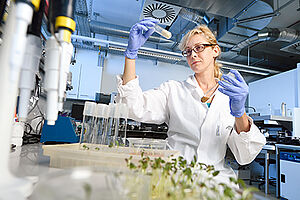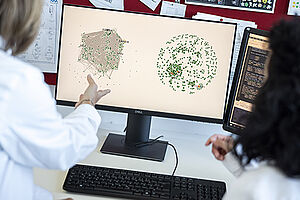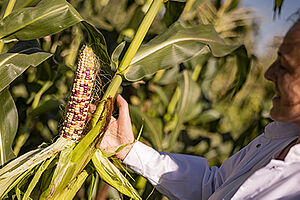Thus, to be able to compete with the speed of climate change and its impact on agriculture, plant breeding must adopt new, multidisciplinary approaches to enhance the rate of genetic gain.
Global food security is one of the key challenges of this century with a dramatic increase of the current human population and the ongoing climate change affecting crop quality and yield. In the last few centuries, plant breeders successfully used crossing and relied on phenotype-based selection to improve the agronomic character of cultivated crops. However, we are getting close to the final capacity of these few crops on yield and their tolerance to biotic and abiotic stresses. Thus, to be able to compete with the speed of climate change and its impact on agriculture, plant breeding must adopt new, multidisciplinary approaches to enhance the rate of genetic gain. Next to physiological and biochemical approaches, genomics is at the core of crop improvement. With this method genetic variants can be identified which are the source for phenotypic variation. Further, novel traits and molecular pathways can be characterised that are involved in biotic and abiotic stress tolerance.
Genetic markers as a promising tool
Focusing on non-model plant organisms, we are using state of the art multi-omics technologies (genomics, transcriptomics, phenomics) to develop and characterize DNA-based genetic markers. Such markers are a very versatile tool and are commonly used in basic and applied plant research as well as in breeding and selection programmes. Especially for the latter, a genetic marker reflects a DNA sequence which is linked to a phenotype or trait of interest (e.g. drought tolerance) and can thereby be directly used in marker-assisted selection (MAS).
We further utilize these DNA-based genetic markers for diverse research questions. One endeavour in agricultural sciences is to describe the genetic diversity that is present in a germplasm collection including crop wild relatives. Especially local varieties provide a rich pool of genetic material accumulating genes allowing individuals to resist or tolerate extreme temperatures or drought as well as pests and diseases. Here, we often rely on a quick analysis using SSR markers, but also perform an in-depth RAD-sequencing (Restriction site-associated DNA sequencing) followed by genome-wide association analysis (GWAS) that allows for the identification of genes controlling key traits. For questions around species and population identification and authentication we apply the DNA barcoding strategy, but also develop SNP-based multiplex assays using the high-throughput MassARRAY® genotyping technology (Agena Bioscience®).
DNA extraction and long-term DNA storage
Using these technologies over the past years made us to experts in the extraction of DNA from various tissue types and diverse organisms. We use this knowhow to also analyse eDNA (environmental DNA) samples using Illumina’s MiSeq system. Through our DNA bank facility, which has been established in 2003 (FP6 project EVOLTREE), we provide long-time storage of and access to plant or animal related biological material (e.g. gDNA, tissue) under controlled temperature conditions and corresponding metadata in accordance with strict quality control standards. Supported by a high level of lab automation, the tailor-made laboratory information management system MAPS guarantees failure-free efficient sample and data management. (MAPS.pdf)
Bioinformatics
Finally, data analysis is key. Our bioinformatics team uses established pipelines and tools for standard genomics and transcriptomics data analysis but also works on novel concepts for the integration of multi-omics data. With latest machine learning frameworks, we set up models for the prediction of traits of interest to support and enhance the breeding of climate change resilient crops.
Selected Projects
| WheatVIZ | Towards breeding of drought-tolerant winter wheat via genomics, phenotyping, machine learning, and advanced digital visualization | d4agrotech Initiative, Land Niederösterreich; www.d4agrotech.at |
| PredictBeetWeevil | Data- and model-based prediction of sugar beet weevil occurrence | d4agrotech Initiative, Land Niederösterreich; www.d4agrotech.at |
| FFoQSI | The Austrian Competence Centre for Feed and Food Quality Safety and Innovation wants to make food and food production better, safer and more sustainable | FFG, grant agreement n° 854182; https://www.ffoqsi.at/ |






